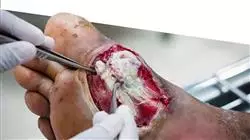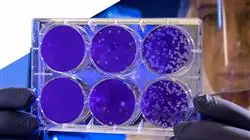University certificate
The world's largest faculty of medicine”
Introduction to the Program
A 100% online academic opportunity to learn in detail the latest medical evidence related to international infectious diseases and their epidemiology"

Infectious diseases have marked the course of world history for centuries. From smallpox, through measles, bubonic plague and the most frequent, COVID-19, these diseases have killed millions of people, left serious consequences in others and caused serious consequences for international health. Thanks to the advances that have been made in science in general and in medicine in particular, it has been possible to work on their diagnosis and treatment in an exhaustive manner, and today there are hundreds of technical, pharmacological and preventive alternatives to focus on their containment.
In this type of situation, physicians are the ones who are at the forefront, so a specialized and updated knowledge of the latest developments in this field becomes a real necessity for all of them. For this reason, having a degree like this Postgraduate diploma in the academic market is a unique opportunity for all professionals to update their knowledge in a 100% online way. It is a multidisciplinary and austere Postgraduate diploma with which you can delve into the epidemiology of infectious diseases, the rational use of antibiotics and the clinical management of parasitic, tropical and international traveler's diseases.
For this, you will have 600 hours of the best theoretical, practical and additional content (presented in different formats, including audiovisual), as well as self-knowledge exercises that will allow you to determine in which aspects you should deepen with greater intensity. In addition, you will be able to access all the material from the beginning of the academic activity and from any device with an internet connection, thanks to which you will be able to customize the 6 months of the course in a way that is totally adapted to your time availability.
You will work on the rational use of antibiotics through an updated and intensive module based on the latest evidence in pharmacology"
This Postgraduate diploma in Infectious Diseases and International Health contains the most complete and up-to-date scientific program on the market. The most important features include:
- Clinical cases presented by experts in Infectious Diseases
- The graphic, schematic, and practical contents with which they are created, provide scientific and practical information on the disciplines that are essential for professional practice
- Practical exercises where the self-assessment process can be carried out to improve learning
- Its special emphasis on innovative methodologies
- Theoretical lessons, questions to the expert, debate forums on controversial topics, and individual reflection assignments
- Content that is accessible from any fixed or portable device with an Internet connection
Would you like to be updated on the latest medical news related to traveler's diarrhea? With this Postgraduate diploma you will delve into its clinical manifestations, diagnosis and treatment"
The program’s teaching staff includes professionals from sector who contribute their work experience to this educational program, as well as renowned specialists from leading societies and prestigious universities.
Its multimedia content, developed with the latest educational technology, will provide the professional with situated and contextual learning, i.e., a simulated environment that will provide an immersive education programmed to learn in real situations.
The design of this program focuses on Problem-Based Learning, by means of which the professional must try to solve the different professional practice situations that are presented throughout the academic course. For this purpose, the student will be assisted by an innovative interactive video system created by renowned experts.
In the virtual classroom you will find self-knowledge exercises, thanks to which you will be able to evaluate which aspects of the syllabus you need to work on more thoroughly"

A comfortable and dynamic option to update your knowledge in relation to vaccination in the international traveler"
Why study at TECH?
TECH is the world’s largest online university. With an impressive catalog of more than 14,000 university programs available in 11 languages, it is positioned as a leader in employability, with a 99% job placement rate. In addition, it relies on an enormous faculty of more than 6,000 professors of the highest international renown.

Study at the world's largest online university and guarantee your professional success. The future starts at TECH”
The world’s best online university according to FORBES
The prestigious Forbes magazine, specialized in business and finance, has highlighted TECH as “the world's best online university” This is what they have recently stated in an article in their digital edition in which they echo the success story of this institution, “thanks to the academic offer it provides, the selection of its teaching staff, and an innovative learning method aimed at educating the professionals of the future”
A revolutionary study method, a cutting-edge faculty and a practical focus: the key to TECH's success.
The most complete study plans on the university scene
TECH offers the most complete study plans on the university scene, with syllabuses that cover fundamental concepts and, at the same time, the main scientific advances in their specific scientific areas. In addition, these programs are continuously being updated to guarantee students the academic vanguard and the most in-demand professional skills. In this way, the university's qualifications provide its graduates with a significant advantage to propel their careers to success.
TECH offers the most comprehensive and intensive study plans on the current university scene.
A world-class teaching staff
TECH's teaching staff is made up of more than 6,000 professors with the highest international recognition. Professors, researchers and top executives of multinational companies, including Isaiah Covington, performance coach of the Boston Celtics; Magda Romanska, principal investigator at Harvard MetaLAB; Ignacio Wistumba, chairman of the department of translational molecular pathology at MD Anderson Cancer Center; and D.W. Pine, creative director of TIME magazine, among others.
Internationally renowned experts, specialized in different branches of Health, Technology, Communication and Business, form part of the TECH faculty.
A unique learning method
TECH is the first university to use Relearning in all its programs. It is the best online learning methodology, accredited with international teaching quality certifications, provided by prestigious educational agencies. In addition, this disruptive educational model is complemented with the “Case Method”, thereby setting up a unique online teaching strategy. Innovative teaching resources are also implemented, including detailed videos, infographics and interactive summaries.
TECH combines Relearning and the Case Method in all its university programs to guarantee excellent theoretical and practical learning, studying whenever and wherever you want.
The world's largest online university
TECH is the world’s largest online university. We are the largest educational institution, with the best and widest online educational catalog, one hundred percent online and covering the vast majority of areas of knowledge. We offer a large selection of our own degrees and accredited online undergraduate and postgraduate degrees. In total, more than 14,000 university degrees, in eleven different languages, make us the largest educational largest in the world.
TECH has the world's most extensive catalog of academic and official programs, available in more than 11 languages.
Google Premier Partner
The American technology giant has awarded TECH the Google Google Premier Partner badge. This award, which is only available to 3% of the world's companies, highlights the efficient, flexible and tailored experience that this university provides to students. The recognition as a Google Premier Partner not only accredits the maximum rigor, performance and investment in TECH's digital infrastructures, but also places this university as one of the world's leading technology companies.
Google has positioned TECH in the top 3% of the world's most important technology companies by awarding it its Google Premier Partner badge.
The official online university of the NBA
TECH is the official online university of the NBA. Thanks to our agreement with the biggest league in basketball, we offer our students exclusive university programs, as well as a wide variety of educational resources focused on the business of the league and other areas of the sports industry. Each program is made up of a uniquely designed syllabus and features exceptional guest hosts: professionals with a distinguished sports background who will offer their expertise on the most relevant topics.
TECH has been selected by the NBA, the world's top basketball league, as its official online university.
The top-rated university by its students
Students have positioned TECH as the world's top-rated university on the main review websites, with a highest rating of 4.9 out of 5, obtained from more than 1,000 reviews. These results consolidate TECH as the benchmark university institution at an international level, reflecting the excellence and positive impact of its educational model.” reflecting the excellence and positive impact of its educational model.”
TECH is the world’s top-rated university by its students.
Leaders in employability
TECH has managed to become the leading university in employability. 99% of its students obtain jobs in the academic field they have studied, within one year of completing any of the university's programs. A similar number achieve immediate career enhancement. All this thanks to a study methodology that bases its effectiveness on the acquisition of practical skills, which are absolutely necessary for professional development.
99% of TECH graduates find a job within a year of completing their studies.
Postgraduate Diploma in Infectious Diseases and International Health
In an increasingly globalised world, international health and infectious disease management have become fundamental aspects of modern medicine. At TECH Global University, we present you with our online postgraduate course, the Postgraduate Diploma in Infectious Diseases and International Health, designed to boost your medical career and provide you with the necessary tools to face today's challenges in this field. At TECH, we understand the importance of flexibility in learning. Our program allows you to access quality lectures and resources from anywhere and at any time, adapting to your schedule and pace of life. You no longer have to worry about commuting or fixed schedules. Through our online classes, you can gain up-to-date knowledge about infectious diseases and international health from the comfort of your home or anywhere else with an internet connection.
Your Passport to Medical Excellence is at TECH
Our Postgraduate Diploma in Infectious Diseases and International Health program is designed to provide you with comprehensive training in the prevention, diagnosis and treatment of infectious diseases, as well as the management of international health situations. You will learn about the latest advances in microbiology, epidemiology, vaccinology and global health policy. TECH Global University is proud to have a renowned teaching team of experts in the field of infectious diseases and international health. Our focus is to provide you with practical and up-to-date knowledge, based on scientific evidence, so that you can become a highly skilled professional and contribute to global wellbeing. Don't miss the opportunity to excel in the exciting field of medicine and make a difference in the fight against infectious diseases worldwide. Enrol now in the Postgraduate Diploma in Infectious Diseases and International Health at TECH Global University and gain the skills you need to advance your medical career and make a significant contribution to global health.







